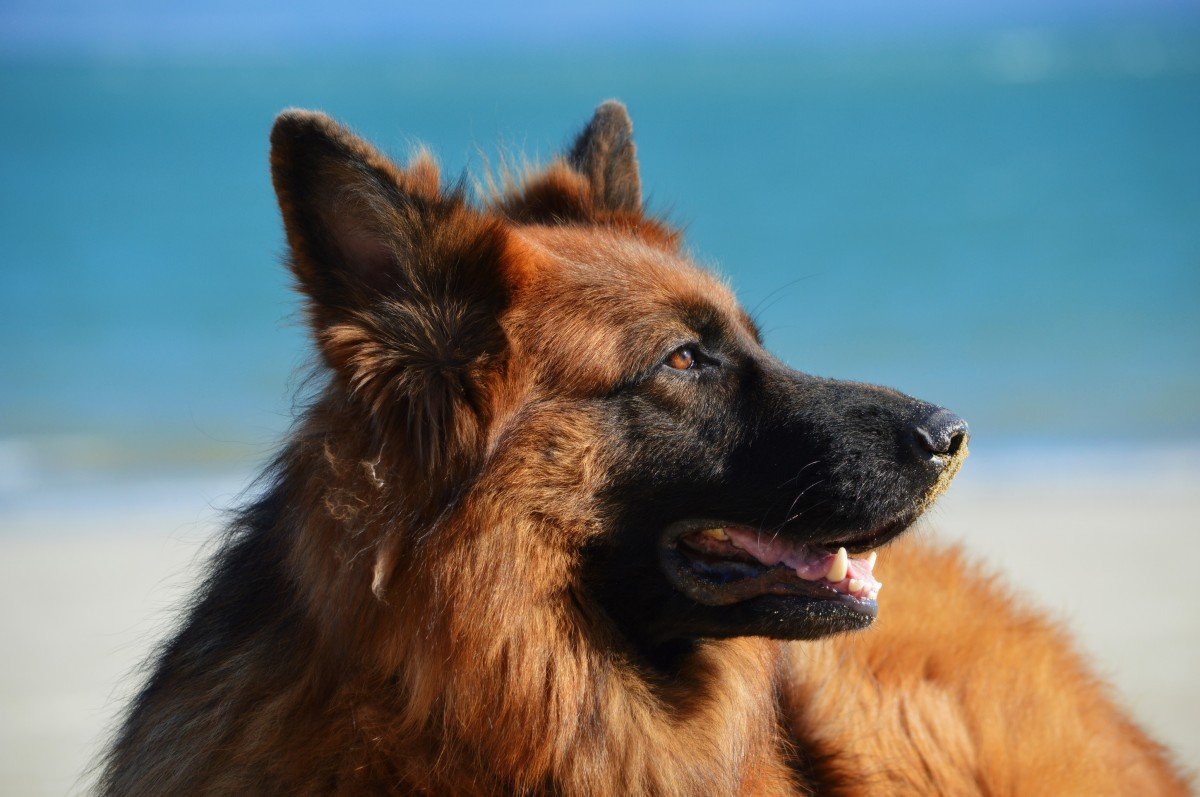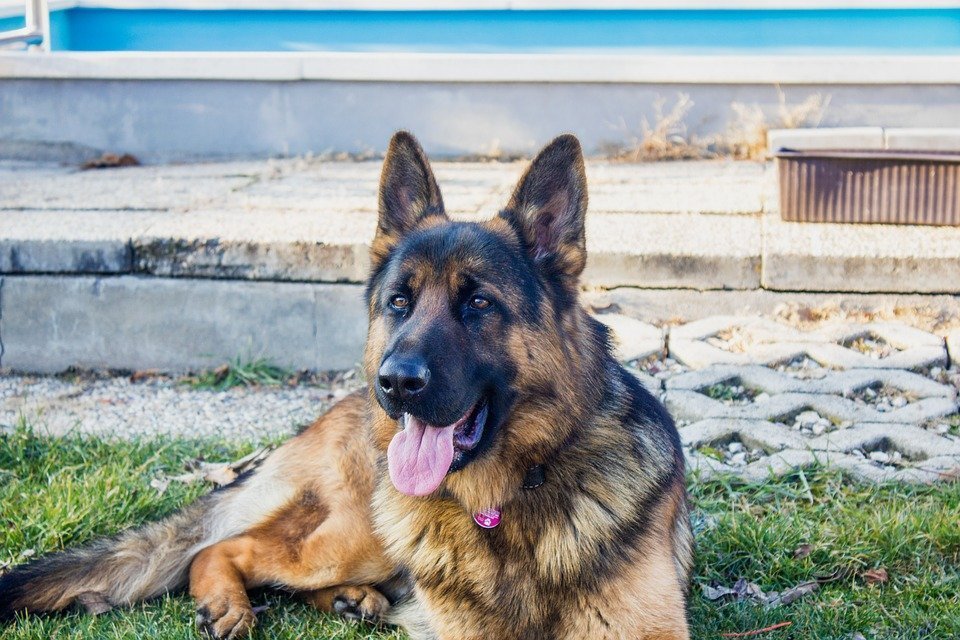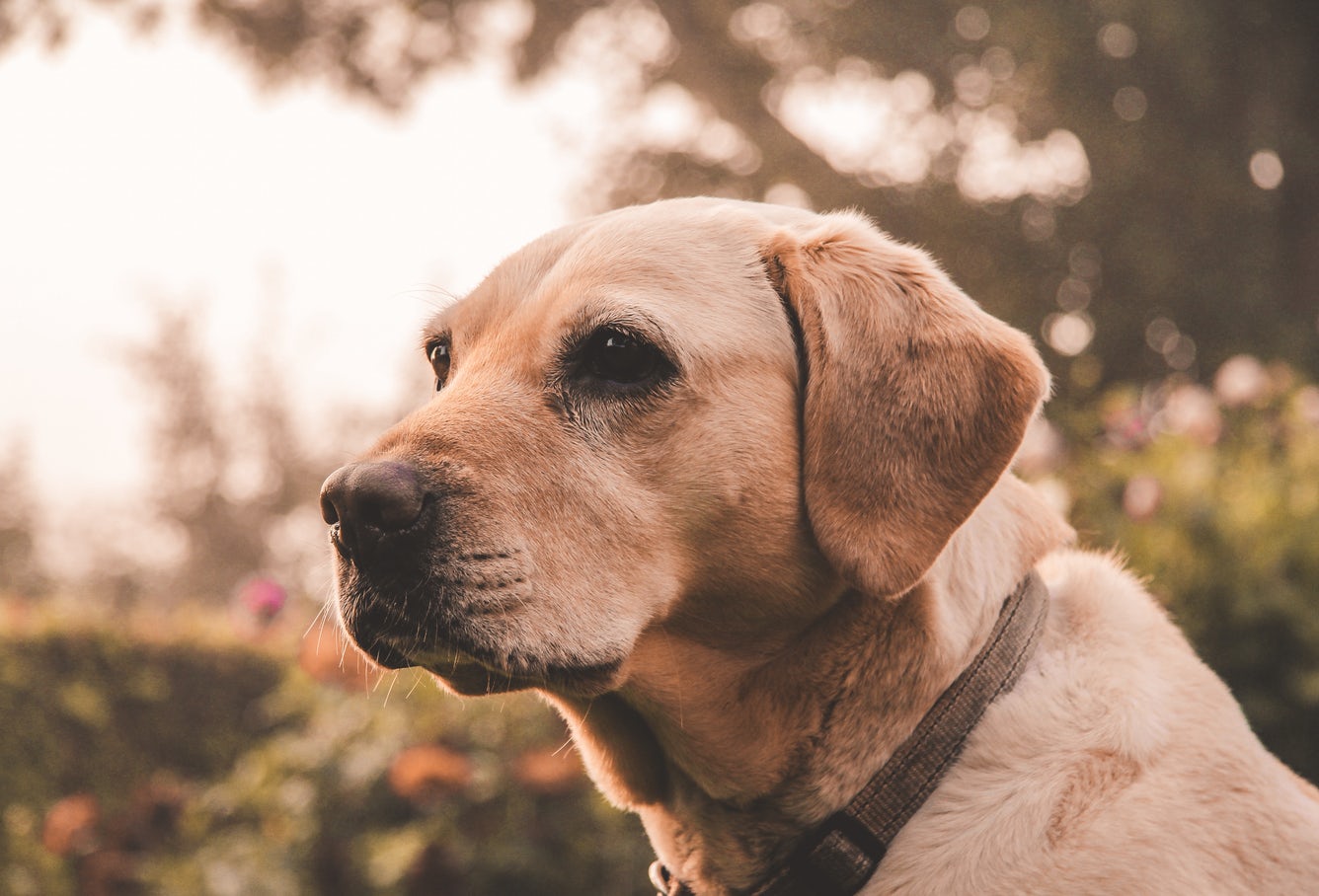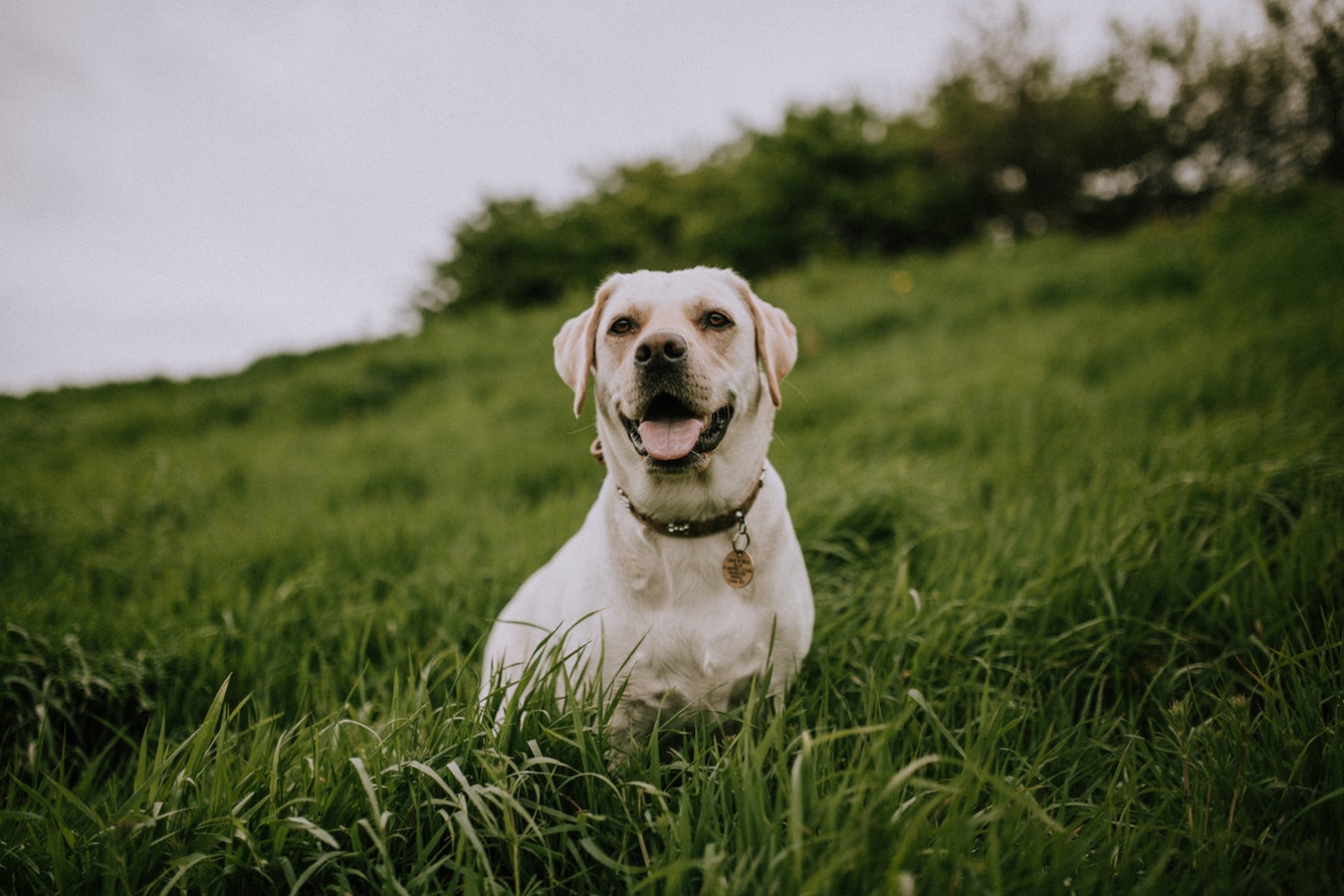This page contains affiliate links. This means that we may get a small commission for recommending products, if you choose to click on something and buy it. This does not cost you anything, but we wanted to be honest and let you know!
(Last Updated On: 15th February 2023)German Shepherds are one of the most popular dog breeds in the US due to them being hardworking and very smart. But, with a poor diet and lack of exercise, these beloved dogs can become overweight and have health problems.
The best dry dog food for German Shepherds is the Royal Canin Dry Kibble, which is specific for this breed and helps support the breed’s sensitive digestive system.
The average German Shepherd can weigh between 70 and 100 LBS when they are fully grown. In order to maintain a healthy weight and support the joints and bones, you should ensure their diet is rich in fats, vitamins, minerals, proteins, and carbs.
Table of Contents
Best Dry Dog Food For German Shepherds
| German Shepherd Food | Designed For | Grain Free |
|---|---|---|
| Royal Canin | Healthy Diet | No |
| EUKANUBA | Healthy Diet | No |
| Orijen Original | Sensitive Stomach | Yes |
| BLUE Wilderness | High Protein | Yes |
| Taste of the Wild | High Protein | Yes |
Ensuring that your German Shepherd has a nutritious healthy diet will increase their hardworking and smart attitude to life. When they are subject to human foods and lack of exercise, the traits that you fell in love with will slowly fade away.
On to a more positive note, there are many excellent foods for German Shepherds that they will love. From grain-free formulas to totally organic dog foods, there is a variety to suit every dog and their owner’s budget.
A targeted diet for German Shepherds is highly recommended in order to meet all their requirements and luckily there are many. Below is a list of the best dog foods for German Shepherds that provide all the nutrients and energy they need.
Royal Canin German Shepherd Dry Dog Food
This German Shepherd dry dog food from Royal Canin is designed to provide your German Shepherds over 15 months old with all the necessary nutrients.
German Shepherds are known to have a more sensitive digestive system in comparison to other breeds, which often leads to bloating, frequent digestive upsets, and soft stools. Their skin is also very sensitive and alkaline, which is why it’s important for them to maintain a diet that is tailor-made for their needs.
A brief overview of the pros and cons of Royal Canin food includes:
Pros:
- Dogs are sure to like the taste of this food
- Improves digestive health and stools
- Enriched with DHA and EPA
- Supports sensitive skin, healthy bones and joints, and digestive performance
- Helps to maintain skin health and coat shine.
Cons:
- Some dogs might find the kibble to be too large
This dog food contains highly digestible proteins and a selection of fibers that helps to maintain a balanced intestinal flora and limit intestinal fermentation. It also contains nutrients that support coat and skin health that are enriched with DHA and EPA to support healthy joints and bones.
Even the design of the kibble texture, shape, and size make it easy for German Shepherds to pick up. Overall, it is the best dog food for German Shepherds, and being breed-specific, it has all the nutrients that they require.
Check on Amazon Check on Chewy
EUKANUBA Breed Specific Food
With different breeds requiring different nutritional needs, Germans are no different. Eukanuba’s German Shepherd Dog food has a 3D DENTADEFENSE System that allows it to reduce tartar build-up in under a month.
It contains animal-based, high-quality proteins to help promote lean and strong muscles for the optimal German Shepherd body condition. It also includes a specialized fiber system that promotes healthy digestion and nutrient absorption.
In terms of the pros and cons of Eukanuba’s Food, they include:
Pros:
- Specially formulated for German Shepherds
- Promotes healthy coat and skin
- Reduces tartar build-up
- Tastes great
- Free of by-products and fillers
- Contains animal-based protein
Cons:
- Fairly expensive
This dog food promotes a shiny coat and healthy skin through their included optimal levels of omega-3 and omega-6 fatty acids. It also does not include any filler ingredients, such as wheat, and corn, as well as the absence of various by-products.
Check on Amazon Check on Chewy
Orijen Original Dry Dog Food
This adult dog food by Orijen has a high content of meat meal, with the first two ingredients on the list being a boneless chicken and boneless turkey.
It has 80% of poultry, fish, and egg ingredients, followed by 20% of vegetables, fruits, and botanical ingredients.
This food also has 0% of plant protein concentrate, tapioca, potato, and grains. The high meat content allows your German Shepherd to keep their lean and muscular tissue mass. While their low glycemic and low carbohydrate formula helps to maintain balanced and healthy blood sugar.
The pros and cons of Orijen’s Adult Dog Food include:
Pros:
- Top-quality percentage of nutrients
- High protein content
- Promotes shiny coat and normal stools
- No low-quality preservatives, chemicals, and fillers
- Sustainable amount of grain-free carbohydrates
Cons:
- Pea might cause some dogs to have stomach issues
- Kibble size is a bit large
- On the pricier side
The absence of fillers, such as soy, wheat, and corn, allows you to avoid any digestive issues with your dog. German Shepherds that have allergic reactions to gluten or tend to have trouble absorbing will love this brand’s food. It also does not include many carbs, which helps you to maintain the weight of your dog.
Overall, it is the best dog food for German Shepherds with sensitive stomachs that can’t handle the fillers or grains.
Check on AmazonBLUE Wilderness High Protein Dog Food
The BLUE Wilderness High Protein, Grain-Free adult dry dog food is inspired by the diet of wolves and contains salmon that your German Shepherd is sure to love. It’s made with fishmeal, chicken meal, and deboned salmon to provide your dog with all the protein that they need.
It also contains potatoes, peas, and sweet potatoes to provide a healthy amount of carbohydrates. To top it all off, it also contains carrots, cranberries, and blueberries to support antioxidant enrichment. The pros and cons of this dog food include:
Pros:
- Grain-Free
- Popular with dogs
- High content of meat
- Omega-3 and Omega-6 Fatty acids
- Taurine to help maintain a healthy heart
Cons:
- The smell is quite strong
To support the needs of larger breeds, such as German Shepherds, the food is formulated with chondroitin and glucosamine to help support joint health and overall mobility. The included L-Carnitine helps to develop and maintain lean muscles.
A perfect blend of essential vitamins, Phosphorus, and Calcium allow you to promote strong teeth and bones. A mix of important antioxidants, chelated minerals, and essential vitamins allows the food to support your dog’s immune system.
Check on AmazonTaste of the Wild Grain-Free Natural Food
Many dogs don’t enjoy the bland flavor of the vast majority of dog food in the market today. Those may be packed with all the necessary nutrients, but you’ll still find that your dog would prefer something with a little bit of flavor.
Taste of Wild’s formula is made with premium meats, such as duck, venison, quail, lamb, roasted bison, turkey, smoked salmon, buffalo, and wild boar. All of their formulas are grain-free, which makes them easily digestible and rich in carbohydrates.
Pros and cons of the Taste Of The Wild food include:
Pros:
- Made with real roasted meats
- Supplemented with vegetables and fruits
- Delivers natural antioxidants
- Grain-free
- Flavored food
Cons:
- Some reports of this causing upset stomachs
Taste of the Wild’s food includes breed-specific prebiotics that are naturally found in the tract. Fruits and vegetables provide the antioxidants in the food while the guaranteed levels of vitamin E, selenium, and zinc support the optimal cellular health.
As with most of the dry adult dog foods, you’ll find that this one also has Omega-3 and Omega-6 Fatty Acids to help maintain your dog’s shiny coat, healthy skin, and overall health.
Check on Amazon Check on Chewy
German Shepherd Dog Food Buying Guide
German Shepherds have known for their black and tan coat as well as their wolf-like features. They are often associated with law enforcement due to their fierce devotion to their owners and are also one of the most trainable breeds along with their muscular bodies. They are a loyal and intelligent breed, who require quite a bit of exercise and good veterinary care. All of this means that they need to have high-quality nutrition to keep their bodies running at their best.
German Shepherds do tend to eat a lot of food, but not all food geared towards German Shepherds is actually good for them. Since German Shepherds are prone to over-eating which can lead to gastrointestinal distress, owners need to watch how much they eat and what they eat. Below are some factors that you should consider before buying any food at your local store.
How Much Should You Feed A German Shepherd?
It can be hard to tell how much you should feed your German Shepherd or to know if they are being fed too much. It’s important to pay attention to their eating habits, set up a feeding schedule that they can learn. The average German Shepherd eats between three to four cups of food every day. However, that can depend on the weight of your dog as well as their activity level. You should just ensure that they are getting more than 1700 calories per day.
A method that many German Shepherd owners follow is to feel the sides of your dog. You should be able to feel their ribs, but not be able to see them. If you can see and feel their ribs, then they need to be fed more. If you can’t see or feel their ribs, then you might want to decrease the amount of food they are being fed.
Below is a typical table that you can find with most dog foods. The best advice is to follow the feeding table of whichever brand you choose to buy.
| Dog Weight | Medium Activity Dog (Feed per day) | High Activity Dog (Feed per day) |
| 57.3 lbs. | 4 ¼ cups | 5 |
| 61.7 lbs. | 4 ½ cups | 5 ¼ |
| 70.5 lbs. | 5 cups | 5 ⅞ |
| 83.8 lbs. | 5 ¾ cups | 6 ⅝ |
| 88.2 lbs. | 6 cups | 6 ⅞ |
| 97 lbs. | 6 ⅜ cups | 7 ⅜ |
Health Concerns for German Shepherd
Many German Shepherds are healthy, but they are susceptible to some health concerns more so than other breeds. Many of the health concerns are congenital and therefore there isn’t much you can do about them. But there are some that can develop due to a dog’s lifestyle or the environment.
These include Perianal Fistulas, Food Allergies, Food Intolerances, Hip Dysplasia, Osteoarthritis, Inflammatory Bowel Disease, and Bloating. If you ever feel that your dog might be suffering from one of these health concerns, regardless of which one, you should consult with your veterinarian.
Perianal Fistulas
Perianal Fistulas are small tunnels that form around the anus that connects the anal glands. They are quite painful as they are easy to get infections and often exude pus. These are the most common in German Shepherds.
Food Allergies
German Shepherds are quite prone to developing food allergies, which manifest as itchy and dry paws, ears, or skin. However, some can even exhibit gastrointestinal symptoms. Food allergies are prone to happen when your German Shepherds body mistake safe proteins as pathogens, this causes an unnecessary response from their immune system.
Food Intolerances
Unlike food allergies, which generally cause skin problems, food intolerances can make it difficult for your dog to digest some proteins. This can then lead to them vomiting or experiencing diarrhea.
Hip Dysplasia
Hip Dysplasia is a common health concern with larger breeds with German Shepherds being no different as they can be quite painful.
Osteoarthritis
German Shepherds, similar to other larger breeds, can often develop osteoarthritis, as they get older. This can cause joint pains, which limits their mobility.
Inflammatory Bowel Disease
Many German Shepherds suffer from Inflammatory Bowel Disease, which manifests like Crohn’s disease does with humans. There are studies that connect inflammatory bowel disease and perianal fistulas with the German Shepherd breed.
Bloating
One of the highest health concerns that German Shepherds, and other deep-chested breeds, have is developing bloat. This condition is potentially fatal, which occurs when either the stomach or intestine of your dog gets twisted, therein trapping any gas inside. Though the actual cause of developing bloat is not understood well, it is strongly encouraged for you to encourage your dog to eat slowly.
German Shepherd Diet and Nutrition Requirements
On average, German Shepherds usually weight somewhere between 60 lbs. to 80 lbs., with most of the weight coming from muscle and solid bones. German Shepherds are known for their strength and intelligence, as well as being athletic and active dogs.
This means that they require a diet that provides them with the right amount of protein to support their muscle health and provide fat for energy. In accordance with the National Research Council of the National Academies, German Shepherds who are active require a calorie intake of 1,740 to 2,100 calories on average. While less active and older dogs require a lower calorie count.
The Association of American Feed Control Officials (AAFCO) recommends that your German Shepherds diet should consist of a minimum 22% of protein for growing dogs and 18% protein for maintenance. Fat should account for a minimum of 8% of their diet for puppies and 5% for adult German Shepherds.
As German Shepherds grow quite quickly, they should only be kept on a puppy specific diet for no more than six months. If you switch to adult dog food after six months, it may help at preventing joint and bone-related issues pertaining to their rapid growth.
Ingredients To Look Out For
There are various ingredients to look out for that are great for your dog, but the highest priority should fall towards looking for a healthy source of protein. The protein should be the first ingredient on the ingredient list.
If your German Shepherd is allergic to anything, you should ensure that those ingredients are not included in the ingredient list. Fish, beef, and chicken are all great choices, but there are dogs within this breed that might be allergic to one of those proteins.
On top of that, there should also be a source of fat present. Fish is a great option for this, as well as vegetable oils, which are often used for German Shepherds. In order for them to keep their energy up, you should look for carbohydrates, like rice and barley. Protein and fat are two of the most important components in the diet of a German Shepherd.
How To Avoid German Shepherd Bloating
It can be common in larger breeds to come down with gastric dilation-volvulus, also referred to as bloating. This generally occurs when your dog eats their food too quickly and don’t take time to actually chew it. If this occurs, this could be quite a serious issue for your dog that can shock or stop your dog’s heart.
It might be worthwhile to try putting a tennis ball into their food bowl as they eat in order to slow them down. Or you can even try to find a food bowl that is more ring-like, rather than a typical bowl. Their recommended calorie should be split into two or more meals a day. You should also avoid taking them for a run more than an hour before and after their meal.
German Shepherd Food Allergies
You’ll find that a number of German Shepherds have food allergies, which is actually quite common in the breed. Their allergies include wheat and corn, so it’s best to avoid foods that have high quantities of wheat and corn contents.
Other things, such as food preservatives, colorings, and other chemicals that they would not encounter in the wild, can often cause allergic reactions. Many dogs in this breed are allergic dairy, including eggs and soy, as well as chicken and beef.
If you find that your dog is suffering from food allergies, you should switch their food to one that uses lamb for the protein and rice as a carbohydrate. If they are experiencing bowel issues, or constantly find them itching, you could try switching the brand to one that uses different carbohydrates, fat, and protein sources.
Pancreatic Insufficiency
German Shepherds are prone to having digestive issues, which are sometimes caused by specific illnesses. Though all dogs in this breed are not likely to have this, it isn’t unusual to see. One of the illnesses can be a genetic condition called exocrine pancreatic insufficiency. With this, your pancreas is not able to produce enough digestive enzymes, which are needed to break down and digest food.
Sadly, this disorder is degenerative, which means that it worsens as time passes, so you’ll be able to notice gas issues and diarrhea. If your dog has this disorder, bacteria will develop in the intestinal tract, as there are not enough digestive juices to keep their growth at bay. With the growth of the bacteria and undigested food can cause your dog to have major discomfort.
Eosinophilic Gastroenteritis
Eosinophilic Gastroenteritis causes an inflammation of the stomach and intestinal tract, which is common in larger breeds, such as the German Shepherd. There are various things that are linked to the problem, such as soft tissue injuries, viral illnesses, flea allergies, bacterial infections, and parasites.
If your dog has this, you’ll probably see poor appetite, weight loss, vomiting, and chronic diarrhea with this disease. Malnutrition and dehydration are also common issues with this disease. The symptoms are quite similar to inflammatory bowel syndrome, which is why they are often confused with one another.
However, gastroenteritis typically requires a shorter-term treatment, but there are some outliers, which might require a longer treatment.
Important Factors To Consider
In order to find the best German Shepherd dog food, there are various different aspects that should be considered to find one that best suits your dog. There are certain characteristics that need to be met to find the best dog food for German Shepherds. Some of the factors include:
- As they are prone to food allergies, it is recommended that you search for dog foods that do not contain common allergens, such as beef, chicken, wheat, and corn.
- As they are likely to develop osteoarthritis or some other joint maladies, it is recommended that you look for a dog food that contains chondroitin and glucosamine, which is great for treating and preventing such problems.
- Omega 3 and Omega 6 Fatty Acids are great additions to your German Shepherds diet as it helps to promote a shiny coat, joint health, and reduces inflammatory responses.
- Dog foods that include probiotics as they help to soothe your dog’s digestive system while improving its functions.
- Keep an eye on your dog to see which foods they are able to digest well. Most dogs are able to digest rice and lamb easily.
- As most German Shepherds suffer from bloat, you should continue to encourage your dog to chew slowly rather than just scarfing it all down.
German Shepherds are active, large dogs, which means they need high-quality nutritious meals. All the information above, as well as the products we’ve mentioned, is some of the best in the market today. Everything above is especially piled together to offer you with all the relevant information that you need to provide a healthy life for your German Shepherd.
Ian is an avid outdoorsman and dog lover. He lives in Central Florida with his wife Heather, and their 2 dogs – Panda (Purebread Rough Collie X English Golden Retriever) & Kuma (Blue Merl Purebread Rough Collie)










